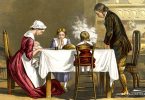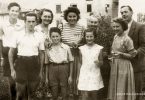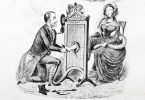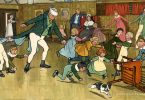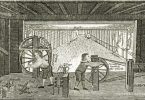The 1770s were a decade of new discoveries, scientific breakthroughs, and innovations that were the prototypes of things we know today. New lands were discovered and settled by Europeans. Theories on chemistry and politics took giant leaps forward. The Age of Reason began, and its teachings continue to influence modern society today. These are some of the highlights of the decade that your ancestors may have known about, experienced, enjoyed, or participated in.
Important Discoveries
James Watt built a working prototype of a steam engine, setting the stage for the later development of steam engine technology and travel using it on both rivers and railroads. A smallpox epidemic occurred in New England but was then cured by the invention of the first inoculation (which later became the field of vaccines) by Edward Jenner.
Captain James Cook discovered the islands of South Georgia and the South Sandwich Islands in the Atlantic Ocean and claimed them in the name of Great Britain.
The discovery that the use of rubber is an effective method to remove pencil marks from paper ushers in the era of erasers. This discovery was made by a British chemist named Joseph Priestley.
The manufacture of Limoges porcelain was established in France.
Nitrogen gas was discovered by Scottish scientist Daniel Rutherford. Hilaire Rouelle, a French scientist, discovers urea.
The marine chronometer was invented by John Harrison. This invention won him the Longitude prize.
A German cobbler named Johann Birkenstock invents the first Birkenstock sandals.
Pre-Revolutionary America
The American Revolution officially began later in this decade. The earlier part of the decade was a period of chaos in the American colonies, as revolutionary sentiment began to become more popular among the people. Things like the Boston Massacre and the Boston Tea Party took place in the early part of the 1770s. The First Continental Congress was called, and the Declaration of Independence was written and signed, letting Great Britain know that the colonies intended to be an independent country of their own.
This was something that had never been done before in the known history of the world, with a set of colonies not only rebelling against the mother country but setting up a new government from scratch that was unlike any other government the planet had ever seen. It was a risky experience, as the leaders of the movement could have been executed by Great Britain if they lost the Revolution. But, the revolutionary sentiment was high in the colonies at this time in history, and it proved to be wonderfully successful.
Other Important Things in the News
The Iron Bridge was built across the Severn River in Shropshire in England. It was the world’s first bridge that was built totally out of cast iron. It opened to traffic on January 1, 1781, about a decade after it was built.
The spinning mule was invented and perfected by an inventor from Lancashire in England named Samuel Crompton.
The Boulton and Watt’s Smethwick Engine was invented and brought into service. It is now the oldest working engine on the planet.

